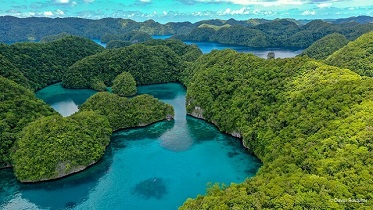 PALAU—The Palau Bureau of Tourism, Sustainable Travel International, and Slow Food have launched a new project in Palau that aims to mitigate the tourism sector’s carbon footprint and establish Palau as the world’s first “Carbon Neutral Tourism Destination.” The project is taking an innovative destination-level approach that includes promoting local food production within tourism and developing a carbon management program for tourists. This project supports the objectives of the Coalition of Fragile Ecosystems (COFE) and International Cooperation and Development Fund (TaiwanICDF) and has been endorsed by various government agencies, including Palau’s Ministry of Natural Resources, Environment and Tourism; Ministry of Community and Cultural Affairs; Ministry of Education; the Our Oceans 2020 Organizing Committee; and the Office of the President.
PALAU—The Palau Bureau of Tourism, Sustainable Travel International, and Slow Food have launched a new project in Palau that aims to mitigate the tourism sector’s carbon footprint and establish Palau as the world’s first “Carbon Neutral Tourism Destination.” The project is taking an innovative destination-level approach that includes promoting local food production within tourism and developing a carbon management program for tourists. This project supports the objectives of the Coalition of Fragile Ecosystems (COFE) and International Cooperation and Development Fund (TaiwanICDF) and has been endorsed by various government agencies, including Palau’s Ministry of Natural Resources, Environment and Tourism; Ministry of Community and Cultural Affairs; Ministry of Education; the Our Oceans 2020 Organizing Committee; and the Office of the President.
Known for its unspoiled natural beauty and pristine seas, the Pacific Island nation of Palau is regarded as one of the top marine tourism destinations in the world. Last year, more than 89,000 international tourists visited the country, which has a population of just under 22,000. As such, tourism represents the islands’ main source of economic income and employment.
As a small island destination, Palau is extremely vulnerable to the impacts of climate change, which threaten the islands’ marine ecosystems, coastal communities, and tourism industry. While tourism is the economic lifeblood of the island, it also contributes to the climate crisis. Tourists are responsible for a significant portion of Palau’s carbon footprint as they travel to the remote island by plane and consume food imported from overseas.
World’s First Mandatory Eco-Pledge
In recent years, Palau has taken extensive measures to further environmental protection and responsible tourism. This includes establishing one of the world’s largest marine sanctuaries; creating the world’s first mandatory eco-pledge (Palau Pledge) that all visitors are required to sign upon entry; banning tour operators from utilizing single-use plastics and styrofoam; and protecting its marine environment through the adoption of the world’s strictest national sunscreen standard. This bold new initiative, which is being led by Sustainable Travel International, builds upon the country’s past efforts to specifically address the tourism sector’s climate impact.
This project will reduce the carbon footprint of tourism in Palau by increasing the proportion of food that is sourced from local producers and reducing the industry’s dependence on imports. Among other activities, the project will accomplish this by celebrating the islands’ gastronomic heritage and building the capacity of farmers and fishers to market their products to tourists. Along with combating climate change, this will create income-generating opportunities for local communities and improve food security on the islands. A specific emphasis will be placed on sustainable production and empowering women producers to participate in the tourism value chain.
To compensate for tourism’s unavoidable emissions, the project will develop a first-of-its-kind carbon management program for tourists to Palau. The new online platform will allow visitors to calculate and offset the carbon footprint associated with their trip, including both their travel to and activities in Palau. In line with Palau’s leadership in marine conservation, the offset contributions will be invested in blue carbon initiatives, such as mangrove restoration, or sustainable production activities in the region that reduce CO2 emissions. It is estimated that this program has the potential to raise over $1 million a year for these carbon reduction initiatives.
Sustainable Tourism—Only Path Forward
“If the current COVID-19 crisis has taught us anything, it’s that we must strengthen our nation’s resilience to external threats—the greatest of which is climate change,” said Kevin Mesebeluu, Director of the Palau Bureau of Tourism. “Palau is blessed with some of the world’s most pristine natural resources, inherited through culture and tradition, and placed in our trust for the future generation. We must work to actively protect them, while also investing in our people. Palau embraces sustainable tourism as the only path forward in the new era of travel, and we believe that our destination can and must be carbon neutral.”
“This project has enormous potential to transform the traditional tourism model and is a notable step towards lessening the industry’s climate impact. Destinations around the world face these same challenges of balancing tourism growth with environmental protection. Carbon neutrality is the future of tourism and the direction that all destinations must head as they recover from COVID-19. We commend Palau for their continued leadership, and hope this inspires other destinations to strengthen their own climate resilience strategies,” said Paloma Zapata, CEO of Sustainable Travel International.
“The rapid growth of an unsustainable tourist industry based on broken food systems has been a key driver of the climate crisis and ecosystem destruction. This project represents the antithesis, a solution that strives to strengthen and restore value to local food systems, reduce the cultural and environmental damage caused by food imports, and improve the livelihoods of food producers both in Palau and beyond,” said Paolo di Croce, General Secretary of Slow Food International.
For more information on this project, please contact Kaitlyn Brajcich at kaitlynb@sustainabletravel.org. Project updates will be shared regularly on www.sustainabletravel.org.







